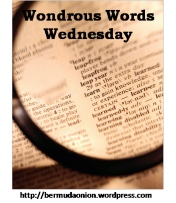 Five years ago, inspired by Stephenie Meyer, I decided to write a book. If she could pen a YA novel during her kids’ swim practice, then so could I. Right?
Five years ago, inspired by Stephenie Meyer, I decided to write a book. If she could pen a YA novel during her kids’ swim practice, then so could I. Right?
While I was learning about author platform, I joined an online writing group called Wordsmith Studio, (WSS), a fun, supportive, and eclectic mix of writers. I met poet Michelle Pond through WSS and was pleased she could share some insight into Jazz Poetry here on the Word Nerd. She blogs at MAPoet and writes poetry with a focus on grief. Thanks, Michelle, for inviting me to the My Writing Process Blog Tour.
Normally, I don’t indulge in stories about my writing, but since Michelle asked…
What am I working on?
I recently finished my first YA manuscript, Redefined. It’s about a girl who struggles against the demands of her overprotective father and the needs of her ailing mother to fight for the independence – and the boy – she wants.
Now I’m crazy/daring/foolish enough to put my work out there by querying agents to find representation for publishing. Querying means lots of research, tweaking of letters, and waiting. Fortunately, I found this great piece on querying at Writer’s Digest and realized that I’m not the only writer to experience anxiety and despair.
While I wait, I’m tackling the next manuscript and penning guest posts. I learned a lot in the five years it took me to write the first book (yes – five), and with the help of the awesome writing software Scrivener, I’m hoping the next book won’t take so long.
Why do I write what I do?
I like to write kid lit, especially YA, because childhood and adolescence are so intense. I vividly remember my teenage years: the way my crush smelled like Ralph Lauren’s Polo cologne mixed with Big Red gum, the way my stomach rolled and my legs noodled at every high school track meet. Teenagers make great characters; they are funny, surprisingly insightful, and passionate. Besides, I never want to write anything steamier than a PG-13 love scene, and I hate violence and gore; that rules out most adult genres.
How does my writing process work?
With most things in life, including dinners and carpool schedules, I like to prepare. Same with writing. For everything from blog posts to novel chapters, I create an outline. Fourteen years of motherhood has taught me that plans change, but I need some basic structure. I also crave routine, so I schedule writing time on regular days in my week. (Of course, summer vacation brings challenges…)
I write an ugly first draft, let it rest for a day, and then come back to knead it into shape. Sometimes my critical editor voice interrupts my “creative” writing time, and I have to work to keep her quiet.
I spend a lot of time in the minivan, and when I get inspiration, I pull out my iPhone and dictate my ideas or snippets of dialogue (yes, I pretend to be my characters) into Evernote or Drafts. NOT when children ride with me, though.
Meet two more writers
That’s enough about me. I’m tagging two of my writing buddies for this blog tour; we can learn more about them next week.

I met Amy Makechnie through blogging. She runs, writes kid lit, and lives in the country with her four children. (Just like me! Except she runs marathons, crazy girl.) Learn more about her:
Amy Makechnie is writer from New Hampshire and has written for many on-line and national publications, and east coast magazines. She is the author of the blog, maisymak.com, where she frequently tattles on her wily flock of children.
 I met Jennifer Chow through Wordsmith Studio. She released her book, The 228 Legacy, last year, and she shares “word nerd” tips with a Chinese spin at her blog; check her out!
I met Jennifer Chow through Wordsmith Studio. She released her book, The 228 Legacy, last year, and she shares “word nerd” tips with a Chinese spin at her blog; check her out!
Jennifer J. Chow, a Chinese-American, married into the Taiwanese culture. Her book, The 228 Legacy, is a 2013 Foreword Review’s Book of the Year Award Finalist in the multicultural category. It was inspired by the family stories she heard after viewing photos of a two-million-person human chain commemorating 228. She has traveled multiple times to Taiwan and visited places dedicated to the incident. Her experience with the elderly comes from a gerontology specialization at Cornell University and her geriatric social work experience. You can visit her online at www.jenniferjchow.com.
Do you write? What are you working on and what is your process? I’d love to know.
Thanks for stopping by!
Julia
 Michael Kindness and Ann Kingman are publishing industry insiders who run a podcast called Books on the Nightstand (BOTNS). I get great reviews and book news from them. At the beginning of summer, they introduced Beach Blanket Book Bingo, an idea they credit to the blog Retreat by Random House.
Michael Kindness and Ann Kingman are publishing industry insiders who run a podcast called Books on the Nightstand (BOTNS). I get great reviews and book news from them. At the beginning of summer, they introduced Beach Blanket Book Bingo, an idea they credit to the blog Retreat by Random House.

















